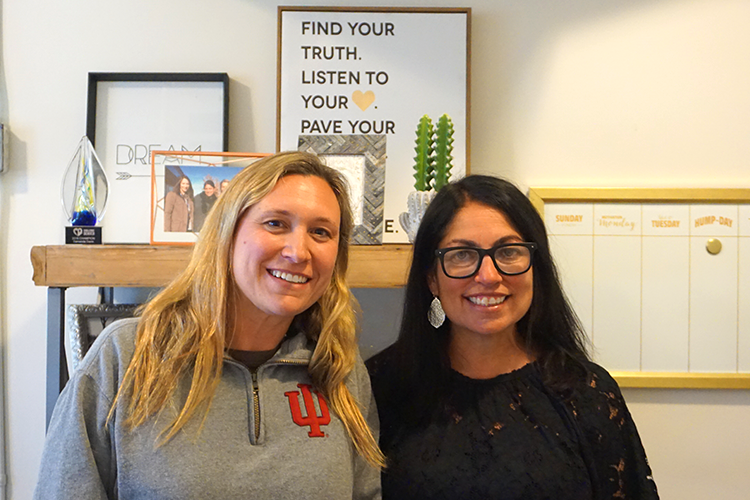
Ms. Berg and Ms. Davis work together to support TJ students, using community and in-school resources. photo by Farah Djama
Everyday, Ms. Berg and Ms. Davis work with students to ensure students have the resources they need to succeed in their academic and personal lives.
Social workers are an essential part of every community, including the Thomas Jefferson High School community. They’re often known as members of the “helping profession,” and they often assist in getting individuals, especially adolescents, through life challenges.
In order to become a school social worker, one would first need to complete an undergraduate degree to then go on into a graduate degree. This undergraduate degree can be in nearly anything, from Social Work or related fields such as Criminal Justice and Anthropology. However, to start a career in school social work in the state of Colorado, one must have a Master’s in Social Work and get a social work license. Like many other Master’s Programs, a master’s in social work can be obtained in two years. There are many different kinds of licenses one can acquire on their path to this career; however, the social working license is absolutely essential.
Here at TJ, we have a multitude of social workers, all tackling different aspects, anything from drug and alcohol prevention to education and general mental health. Annie Berg and Samanda Davis are the two building-based social workers. They handle anything that happens within the building, from security threats to the school to helping a student through a rough day. As building-based social workers, they have their own separate roles, with Davis as a Special Education social worker, helping students with Individual Education Plans, while Berg is a 504 Coordinator, helping students with their 504 plans. Despite these roles, any and all students at TJ can reach out to them for any kind of support.
“I always knew I’d be in some sort of helping capacity,” said Davis. She began her career in the world of social work 23 years ago at a nursing home, under a program called Care Plans. She had initially gotten her undergraduate degree in Criminal Justice, minoring in Social Work at Northern Arizona University. As she was completing her studies, she had interned in the court system and probation courts. Despite enjoying her time there, she didn’t really see it as her passion, and so after she graduated she had applied to everywhere she could, resulting in the first job in social work at a nursing home.
But she didn’t stop at the nursing home. As she was working, she continued interning in health agencies and schools all while completing her Master’s at Arizona State University. Davis reflected on her time interning at a High School while pursuing her degree and found that she “fell in love with that kind of environment.”
When Davis first started working in schools, she was essentially “purchased” by a school for a set number of days, which then resulted in her working at multiple schools. Davis also had leadership positions within the district, which kept her very involved. In current times, it is more common for school social workers to work in one place at a time. As she continued gaining experience, she was then able to help train other future social workers trying to get their license. One of them was Berg.
Berg is not only a building-based social worker, but also a 504 coordinator, meaning that she specializes in helping students with their 504 plans. When she was younger, she was always involved with her local communities, often participating in tutoring and leadership. Berg wanted to figure out how to make her hobby of helping people into a career, leading her to pursue her undergraduate degree in Anthropology. “I always knew it was my calling.” Berg stated.
After graduating, Berg started working with the Big Sisters of Boston, an organization dedicated to help empower young girls through mentorship helping them gain opportunities to pursue their dreams. She did this for about two years before moving on with her career. She moved to Denver, she got married with her husband, and decided to apply to the University of Denver’s Master of Social Work program. After completing her master’s, she then began working towards getting her social work license from the Colorado Department of Education. In order to gain a social work license in Colorado, one must complete 900 hours of supervised work experience, in a school, hospital, mental health clinic/facility or social service agency. Davis, knowing Berg wanted to work in a school, had recommended her to work at middle school in southwest Denver. After working there for some time, she went to TJ to work as a 504 coordinator.
“Being a social worker in a school is different from the other [social work] jobs,” remarked Davis. Different kinds of social workers have different roles, and with school social workers, their main focus is associated with the student’s academic success and how it connects to the journey towards overall personal success. Besides trying to help students to figure out their journey to academic success, Davis and Berg also help with social well being, encouraging students to be self advocates, not only for their academic success but also their social and emotional wellness. Davis and Berg also help with setting up community events such as clothing drives, ensuring to help support the larger TJ community. It takes a village to raise a child, and Berg and Davis help create that village here at TJ.